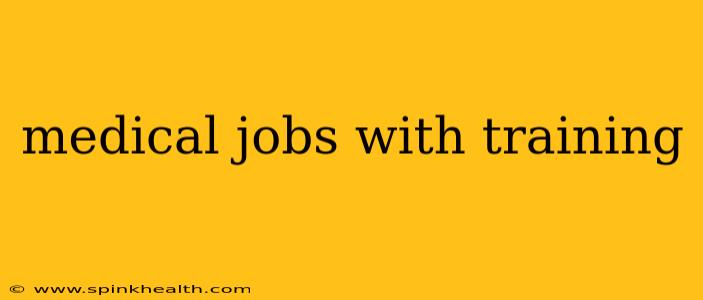Charting Your Course: Medical Jobs That Offer On-the-Job Training
The world of healthcare offers a diverse landscape of rewarding careers, many of which provide valuable on-the-job training. For those seeking a fulfilling career with a clear path to skill development, this is excellent news. Let's explore some medical jobs where you can learn and grow while earning a paycheck. This isn't just about entry-level positions; many established roles offer ongoing training to keep professionals updated on the latest techniques and technologies.
What are some medical jobs that offer training?
This question is broad, as many medical fields offer training opportunities. The specific training will vary depending on the job and employer. However, some roles commonly provide extensive on-the-job training include:
-
Medical Assistant: Medical assistants play a crucial role in clinics and hospitals, assisting physicians with patient care. Their training often involves hands-on experience learning clinical and administrative tasks, from taking vital signs and assisting with exams to managing patient records and scheduling appointments.
-
Certified Nursing Assistant (CNA): CNAs are vital members of the healthcare team, providing direct patient care under the supervision of nurses. Formal training is usually required to become a CNA, often through a vocational school or community college program. However, many facilities provide additional on-the-job training to further develop skills and refine techniques specific to their facility.
-
Phlebotomist: Phlebotomists are responsible for drawing blood samples from patients. While certification is often preferred, many hospitals and clinics offer in-house training programs to teach the necessary skills and techniques, leading to certification.
-
Emergency Medical Technician (EMT): Becoming an EMT requires formal training and certification. However, many ambulance services and hospitals offer ongoing training to update EMTs on the latest emergency medical procedures and techniques, keeping them at the forefront of emergency care.
What kind of medical jobs can I get without a degree?
Many rewarding medical careers don't require a four-year degree. However, formal training or certifications are often necessary. The jobs listed above, Medical Assistant, CNA, Phlebotomist, and EMT, are excellent examples. Additionally, roles such as:
-
Home Health Aide: These professionals provide personal care and support to individuals in their homes. While some states may require certification, others offer on-the-job training.
-
Pharmacy Technician: Pharmacy technicians assist pharmacists in dispensing medications. While certification is often helpful, many pharmacies provide training programs to their employees.
What are the best medical jobs with good pay and benefits?
The "best" job depends on individual preferences and skills. However, some medical roles known for their competitive pay and benefits include:
-
Registered Nurse (RN): While requiring extensive education and licensing, RNs are highly compensated and often receive comprehensive benefits packages.
-
Medical Technologist: These professionals analyze blood and other bodily fluids to diagnose diseases. Their advanced knowledge and skills command a good salary.
-
Respiratory Therapist: Respiratory therapists care for patients with respiratory problems. They are vital members of healthcare teams and often receive excellent pay and benefits.
These roles usually require formal education and certification beyond on-the-job training. However, ongoing continuing education and professional development are standard practice to maintain skills and knowledge.
How long does it take to get trained for a medical job?
Training time varies greatly depending on the chosen career. Becoming a CNA might involve a few weeks of coursework, while becoming a Registered Nurse requires several years of education and clinical practice. Many on-the-job training programs can range from a few days to several months, depending on the complexity of the tasks and the individual's learning pace.
What skills are needed for medical jobs?
Beyond the technical skills specific to each role, several essential soft skills are highly valued in medical professions:
- Empathy and compassion: Connecting with patients on a human level is crucial.
- Communication skills: Clearly communicating with patients, colleagues, and supervisors is vital.
- Problem-solving skills: Medical situations often require quick thinking and effective decision-making.
- Attention to detail: Accuracy is paramount in medical settings.
- Teamwork: Healthcare is a collaborative environment; teamwork is essential.
Starting a career in healthcare is an exciting journey. With diligence and a desire to learn, many opportunities for growth and fulfillment await. Remember to research specific requirements and training programs available in your area to find the perfect path for your ambitions.

